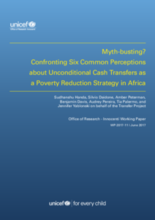ABSTRACT
In this paper we summarize evidence on six perceptions associated with cash transfer programming, using eight rigorous evaluations conducted on large-scale government unconditional cash transfers in sub-Saharan Africa, under the Transfer Project. Specifically, we investigate if transfers: 1) induce higher spending on alcohol or tobacco; 2) are fully consumed (rather than invested); 3) create dependency (reduce participation in productive activities); 4) increase fertility; 5) lead to negative community-level economic impacts (including price distortion and inflation), and 6) are fiscally unsustainable. We present evidence refuting each claim, leading to the conclusion that these perceptions – insofar as they are utilized in policy debates – undercut potential improvements in well-being and livelihood strengthening among the poor, which these programmes can bring about in sub-Saharan Africa, and globally. We conclude by underscoring outstanding research gaps and policy implications for the continued expansion of unconditional cash transfers in the region and beyond.

